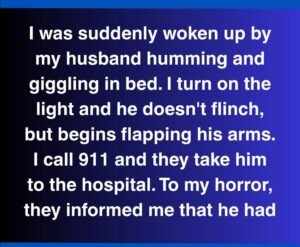My Husband’s Midnight Laughter Led Me to His Hidden Double Life

I was jolted awake one night by the strangest sound—my husband laughing softly in his sleep. At first, I thought it was a dream. But when I turned on the light, he didn’t even blink. Instead, he began flapping his arms like a child pretending to fly. Alarmed, I called 911.
At the hospital, doctors explained he had experienced a mild seizure, likely brought on by exhaustion or stress. As I sat in the emergency room, watching him hooked up to monitors and breathing through a mask, a nurse gently asked:
“Has he been acting unusual lately?”
The honest answer was yes.
For months, his routines had shifted. He stayed up late, shutting his laptop whenever I walked in. His phone lived in his pocket—even in the bathroom—and was always on silent. Once, I overheard him mention a woman’s name—Nadia—on the phone. He brushed it off as a “work contact.” I wanted to believe him. Our finances had been tight, and I assumed the secrecy was tied to money stress.
But seeing him limp and silent in that hospital bed, I couldn’t shake the thought that something else was going on.
When I went home to pack an overnight bag, instinct told me to bring his laptop. It wasn’t password-protected. On the desktop sat a folder labeled Invoices_2022. Inside, just one spreadsheet.
What I found nearly stopped my heart.
The sheet listed dozens of transactions—$48,700 over nine months. Each payment marked with the initials N.L.. One entry read: “E-transfer – Nadia L. – $4,200 – ‘Tuition Payment.’”
Confused and trembling, I searched his emails. Hundreds of messages with Nadia’s name filled the screen. Some were casual, some deeply personal—reminiscing about shared memories, discussing regrets, and even referencing a necklace from Santorini.
This wasn’t work. This wasn’t charity.
Then came the photo: my husband kissing the cheek of a much younger woman in a Montreal café. The same weekend he claimed he was away at a “conference.”
I felt like my chest had collapsed.
When he was discharged the next day, he acted normal—chatting with nurses, cracking jokes, sending quick texts when he thought I wasn’t looking. That evening at home, I confronted him.
“Who is Nadia?” I asked.
His face drained of color. Then the words I dreaded: “It’s not what you think.”
Of course, it was exactly what I thought.
He claimed she was the daughter of a family friend, someone he’d been helping through hard times. The money? Support. The emails? Comfort. The kiss? “A mistake.” But when I asked outright if he had slept with her, his pause—just three seconds too long—told me the truth.
I didn’t cry. I didn’t scream. I walked out and stayed with my cousin.
While away, I dug deeper. On social media, I found Nadia had tagged him before—using another name: Shawn. My husband had built an entire second identity.
When I pressed for his financial records, the truth spilled out: his business was failing, credit cards maxed, loans taken out under my name without my knowledge. And Nadia wasn’t just a fling—he had promised to help her launch a “lifestyle brand.”
That was my breaking point. I filed for divorce.
But then came the twist. Months later, a lawyer’s letter arrived: Nadia herself had filed a fraud complaint against him. She claimed he had deceived her too—pretending he was divorced, making financial promises, then vanishing.
Her evidence—emails, voicemails, recordings—became my shield. With it, I secured my share of assets, repaired my credit, and—ironically—kept the house. His reputation and business crumbled.
And me? I rebuilt.
I began teaching music again, joined a women’s support group, and slowly pieced my life back together. At a craft fair, I met Teo, a gentle retired mechanic. No whirlwind romance, just steady kindness. We’re taking things slow—and this time, I’m paying attention to every red flag.
If I learned anything, it’s this: lies rarely stay hidden forever. They leak out in late-night whispers, silent phones, or locked laptops. And when the truth surfaces, it may shatter you—but it will also set you free.